

|
|
Table of Contents: Cover Page Dedication Introduction "America" "Christmas Hymn" "Lines on the Death of J. Quincy Adams" "To Cinque" "New Year's Hymn" "To A.H." "Love" "How Long" "The Arch Apostate" "The Misanthropist" "A Hymn" "Yes! strike again that sounding string" "To -------" "Prayer of the Oppressed" "To S.A.T." "Delusive Hope" "To M.E.A." "A Hymn" "Self-Reliance" "Ode for the Fourth of July" "Midnight Musings" "Ode to Music" "Stanzas for the First of August" "The North Star" (text of all poems) |
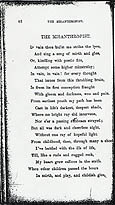
|
IN vain thou bid’st me strike the lyre, And sing a song of mirth and glee, Or, kindling with poetic fire, Attempt some higher minstrelsy; In vain, in vain! for every thought That issues from this throbbing brain, Is from its first conception fraught With gloom and darkness, woe and pain. From earliest youth my path has been Cast in life’s darkest, deepest shade, Where no bright ray did intervene, Nor e’er a passing sunbeam strayed; But all was dark and cheerless night, Without one ray of hopeful light. From childhood, then, through many a shock, I’ve battled with the ills of life, Till, like a rude and rugged rock, My heart grew callous in the strife. When other children passed the hours In mirth, and play, and childish glee, |
||
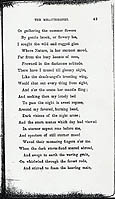
|
Or gathering the summer flowers By gentle brook, or flowery lea, I sought the wild and rugged glen Where Nature, in her sternest mood, Far from the busy haunts of men, Frowned in the darksome solitude. There have I mused till gloomy night, Like the death-angel’s brooding wing, Would shut out every thing from sight, And o’er the scene her mantle fling; And seeking then my lonely bed To pass the night in sweet repose, Around my fevered, burning head, Dark visions of the night arose; And the stern scenes which day had viewed In sterner aspect rose before me, And specters of still sterner mood Waved their menacing fingers o’er me. When the dark storm-fiend soared abroad, And swept to earth the waving grain, On whirlwind through the forest rode, And stirred to foam the heaving main, |
|||
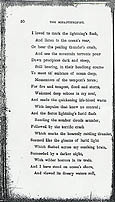
|
I loved to mark the lightning’s flash, And listen to the ocean’s roar, Or hear the pealing thunder’s crash, And see the mountain torrents pour Down precipices dark and steep, Still bearing, in their headlong course To meet th’ embrace of ocean deep, Mementoes of the tempest’s force; For fire and tempest, flood and storm, Wakened deep echoes in my soul, And made the quickening life-blood warm With impulse that knew no control; And the fierce lightning’s lurid flash Rending the somber clouds asunder, Followed by the terrific crash Which marks the hoarsely rattling thunder, Seemed like the gleams of lurid light Which flashed across my seething brain, Succeeded by a darker night, With wilder horrors in its train. And I have stood on ocean’s shore, And viewed its dreary waters roll, |
|||
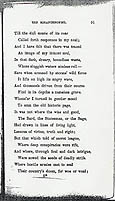
|
Till the dull music of its roar Called forth responses in my soul; And I have felt that there was traced An image of my inmost soul, In that dark, dreary, boundless waste, Whose sluggish waters aimless roll --- Save when aroused by storms’ wild force It lifts on high its angry wave, And thousands driven from their course Find in its depths a nameless grave. Whene’er I turned in gentler mood To scan the old historic page, It was not where the wise and good, The Bard, the Statesman, or the Sage, Had drawn in lines of living light, Lessons of virtue, truth and right; But that which told of secret league, Where deep conspiracies were rife, And where, through foul and dark intrigue, Were sowed the seeds of deadly strife. Where hostile armies met to seal Their country’s doom, for woe or weal; |
|||
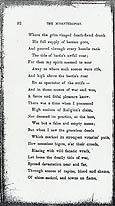
|
Where the grim-visaged death-fiend drank His full supply of human gore, And poured through every hostile rank The tide of battle’s awful roar; For then my spirit seemed to soar Away to where such scenes were rife, And high above the battle’s roar Sit as spectator of the strife --- And in those scenes of war and woe, A fierce and fitful pleasure know. There was a time when I possessed High notions of Religion’s claim, Nor deemed its practice, at the best, Was but a false and empty name; But when I saw the graceless deeds Which marked its strongest votaries’ path, How senseless bigots, o’er their creeds, Blazing with wild fanatic wrath, Let loose the deadly tide of war, Spread devastation near and far, Through scenes of rapine, blood and shame, Of cities sacked, and towns on flame, |
|||
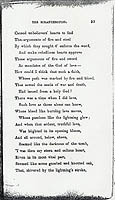
|
Caused unbelievers’ hearts to feel The arguments of fire and steel By which they sought t’ enforce the word, And make rebellious hearts approve Those arguments of fire and sword As mandates of the God of love --- How could I think that such a faith, Whose path was marked by fire and blood, That sowed the seeds of war and death, Had issued from a holy God? There was a time when I did love, Such love as those alone can know, Whose blood like burning lava moves, Whose passions like the lightning glow; And when that ardent, truthful love, Was blighted in its opening bloom, And all around, below, above, Seemed like the darkness of the tomb, ‘T was then my stern and callous heart, Riven in its most vital part, Seemed like some gnarled and knotted oak, That, shivered by the lightning’s stroke, |
|||
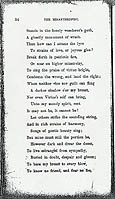
|
Stands in the lonely wanderer’s path, A ghastly monument of wrath. Then how can I attune the lyre To strains of love, or joyous glee? Break forth in patriotic fire, Or soar on higher minstrelsy, To sing the praise of virtue bright, Condemn the wrong, and laud the right; When neither vice nor guilt can fling A darker shadow o’er my breast, Nor even Virtue’s self can bring, Unto my moody spirit, rest. It may not be, it cannot be! Let others strike the sounding string, And in rich strains of harmony, Songs of poetic beauty sing; But mine must still the portion be, However dark and drear the doom, To live estranged from sympathy, Buried in doubt, despair and gloom; To bare my breast to every blow, To know no friend, and fear no foe, |
|||
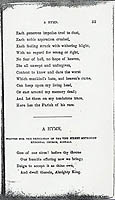
|
Each generous impulse trod to dust, Each noble aspiration crushed, Each feeling struck with withering blight, With no regard for wrong or right, No fear of hell, no hope of heaven, Die all unwept and unforgiven, Content to know and dare the worst Which mankind’s hate, and heaven’s curse, Can heap upon my living head, Or cast around my memory dead; And let them on my tombstone trace, Here lies the Pariah of his race.
|
|||